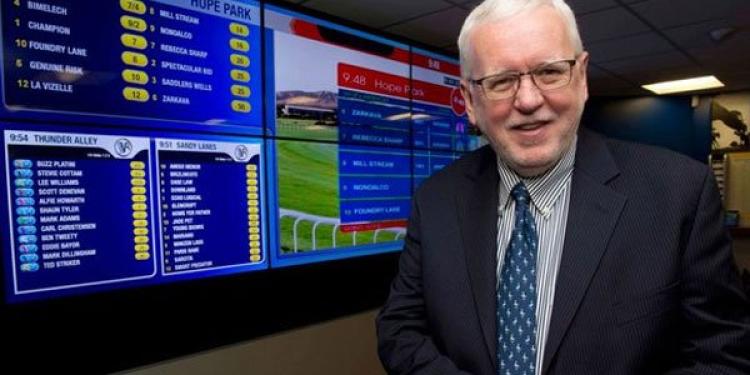William Hill’s Boss Compares Reining in of Gambling to Killing Horses
Posted: March 3, 2014
Updated: October 4, 2017

Ralph Topping claimed that restriction of fixed odd betting terminals in the UK would be similar to shooting horses and greyhounds.
Fixed odd betting terminals (FOBTs) in the UK are very hot topic at the moment, which causes harsh discussions among supporters and opposers. The fact that large amounts of money can be bet for short periods of time, makes these machines highly addictive, therefore their nickname “crack cocaine of gambling”, seems pretty appropriate.
The fact that 33,000 FOBTs in the UK bring revenue of over 1.5 billion a year, make them very important, despite their negative influence on the society, land-based and online gambling sites in the UK.
Betting bosses stand
Clearly, betting shop owners, as well as big operators, which are benefiting from the high demand on FOBTs, are willing to do everything possible, to keep them under full operation.
Therefore, major gambling tycoons from Ladbrokes, Gala, Coral, William Hill, Paddy Power and Betfred, stated in an open letter the virtues of the new Code for Responsible Gambling, which they introduced. This was their way of showing that the problematic addiction issues surrounding the machines are taken into serious consideration.
The executives explained the “extra safeguards” provided: “They include enforced breaks with automatic alerts on money and time spent both for the customers themselves and, importantly, our staff.”
Furthermore: “We have trained nearly 40,000 staff to look out for signs of problem gambling behavior and how best to approach customers who might need help.People who bet responsibly and return are the bedrock of our businesses. We do not want our customers to develop problems.”
Additionally, the letter stressed the importance of the research, which is carried out by the Responsible Gambling Trust. Still, FOBTs critics expressed their concerns, saying that the research is done under serious conflict of interest.
Regardless of the public pressure, betting executives still insisted that gambling is a “safe and popular pastime” for around eight million people a year and claimed that the “overwhelming majority” of players gamble responsibly.
They claimed that problem gambling in the country is relatively low compared to the international levels, and also that it had not increased, since the introduction of FOBTs.
Topping’s opinion
William Hill’s CEO said that restriction of FOBTs would be equal to killing horses
• Betting bosses promote the new Code for Responsible Gambling
• The Labor party openly vouches for the complete banning of FOBTs
• The UK PM is waiting forthe official report on FOBTs before taking further actions
The case of the position expressed by the gambling bosses got even more complicated when Ralph Topping, the Chief Executive of William Hill, Britain’s largest bookmaker, said openly that cracking down on FOBTs would be similar to shooting horses and greyhounds.
He added that horse racing will not “survive in its current form”, without retail betting, because the profit FOBTs make supports other, more traditional types of gambling.
His controversial words were quoted in the media: “If you hit that you might as well get the stun guns ready and start shooting the horse population and the greyhound population.”
His opinion started a wave of dissatisfaction, expressed widely. Matt Zarb-Cousin, an-ex gambling addict, currently working for the Campaign for Fairer Gambling, went further by saying: “Ralph Topping’s comments are not based in reality.”
He added: “As profits from FOBTs have increased, betting on racing has declined. Staff is forced to aggressively market FOBTs to punters, who become addicted to their high speed, high stakes casino games.”
Matt continued: “Voluntary time and spend limits will be overridden by a problem gambler. Pop-ups telling the player how much they have lost will only antagonize them, and might cause them to gamble more. Encouraging staff to intervene on these players may put them at risk if they are working alone, which is often the case.”
Political position
Political circles in the UK had different opinions regarding the FOBTs, operating under UK gambling laws. Edward Miliband, the leader of the Labor party expressed his concern that bookmakers are turning into “mini-casinos” and are “spreading like an epidemic along high streets”.
He gave specific numbers: “In Newham there are 87 betting shops with an estimated 348 machines and across the five Liverpool constituencies there are 153 betting shops with around 559 FOBTs.”
The Labor party altogether currently claims that it is planning the complete banning of FOBTs if it wins the next General Election, despite the fact that the party was initiating liberalizing gambling laws when it was in power in the past.
David Cameron, UK’s Prime Minister, has already expressed the cabinet’s concern about the machines, but explicitly said that the Government is waiting for the official report on FOBTs impact on the society.
An example of the rising attention on the issue is the fact that the Newham Council opposed a new Paddy Power betting shop in 2013, because it was worried that the shop’s main revenues will come from FOBTs.












